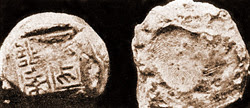"Many people thought the science of fingerprint as individual identity is a new technology invented during the 20th and 21st century."
What if I convince you that your little hypothesis is very much wrong?
Artifacts of ridge-like patterns (fingerprints) pasted on clay tablets are found in some regions of the world which had been since 200 BC traced back to the Babylonians and the Ancient Chinese. Fingerprints are used as signatures after payment of tax during the era.
 |
| Artifact: Finger print prove of the ancient Chinese |
Fingers were impressed on clay during the Qin and Han Dynasties (221 BC - 220 AD) as a mark of trade. Records gotten from the Qin Dynasty (221-206 BC) include details about using fingerprints as evidence during burglary investigations.
Further more, An artifact found in Persia was a book writing by Jaamehol Tawarikh during the 14th century with respect to Khajeh Radhiduddin Fazlllah Hamadani (1247-1318) entails the prove of identifying persons from their fingerprints.
Many artifacts of fingerprints found by archaeologist during modern days brought about the thoughts to solve the misery behind the fingerprints pandemonium.
THE SCIENCE OF FINGERPRINT AND IT'S FIRST PRACTICAL USAGE.
19th century, Year 1858, Sir Williams Herschel working as the chief magistrate of the Hoogly destrict in Jungapoor, India required finger prints of civil workers to prevent fraud and double payments.
Few years later, a Scottish doctor, Henry Faulds working in Japan discovered finger prints left by an artists on ancient pies of clay. Due to the diversities of the fingerprints, he began to have interest in the misery behind fingerprints.
He sought help from his cousin Charles Darwin with developing a fingerprint classification system but null from Darwin. Darwin forwarded the message to Francis Galton.
In 1892, Galton published the first book on fingerprints. In his book, he identified the individuality and uniqueness of fingerprints. He emphasized that, the uniqueness is as a result of a tiny gaps across all ridges called MINUTIAE (with the pronunciation "MINUSHIE").
 |
| finger print minutiae |
Minutiae varies on every fingerprints, this is what forms the uniqueness of every fingerprint.
The difference in minutiae is the science behind the use of fingerprint to determine crime suspect, an identical twin cannot have thesame fingerprints as a result of diversities in minutiae.
Read our next article and discover how open you are to the police.
Read our next article and discover how open you are to the police.
QUESTIONS AND COMMENTS ARE WELCOMED
WE WILL REPLY SOON AS WE CAN
PLEASE SHARE AFTER READING
READ ALSO:


Hmmmmm,
ReplyDeleteSmiles
DeleteInteresting
ReplyDeleteIndeed, pls share for others to gain
DeleteWow
ReplyDeleteDidn't know before
That's the fun abt science, pls share to get others informed
DeleteWhat an eyes opening piece. Keep it up bro
ReplyDeleteThank you sir and don't forget to share
DeleteThis is wonderful
ReplyDeleteVery much wonderful, pls like and share
DeleteGreat
ReplyDeleteThanks,and don't forget to share
DeleteThat's great
ReplyDeleteYeah,it is
DeleteDon't forget to share too
Amazing
ReplyDeleteYeah, share as well
DeleteQuite informative and revealing
ReplyDeleteYeah, share to others to make them know
DeleteWow, this is fascinating
ReplyDeleteYeah,indeed
DeleteDon't forget to share
Don't forget to share
ReplyDeleteHmm
ReplyDeleteScience is life
Exactly
Deletesmiles, i love that. pls share to make others aware
ReplyDeleteHmnm
DeleteGreat
ReplyDeleteYeah,it is
Delete